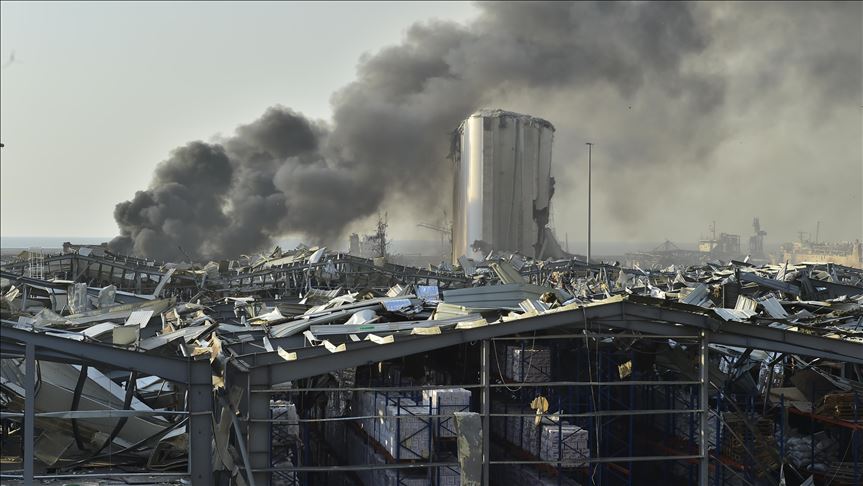Death toll from massive explosion in Beirut rises to 73
Fire at warehouse with explosives at Port of Beirut led to massive blast causing widespread damage, over 3,000 injuries- Nayadiganta English Desk
- 05 August 2020, 03:45

BEIRUT, Lebanon
The death toll from a massive explosion in the Lebanese capital of Beirut has risen to 73, the country's Health Ministry said early Wednesday.
A fire at a warehouse containing explosives at the Port of Beirut led to the blast, which leveled a three-story building and was heard across the city and its suburbs.
More than 3,000 people have been wounded, the ministry added.
Health Minister Hamad Hassan earlier announced that 63 people were killed and 3,000 others injured.
Many neighboring and regional countries including Turkey, Qatar and Libya offered help to Lebanon on Tuesday following the incident.
US President Donald Trump claimed that the devastating blast "looks like a terrible attack."
President points to ammonium nitrate
In a post on the Lebanese Presidency's Twitter account, President Michel Aoun cited ammonium nitrate as the source of the massive explosion, saying that keeping 2,750 tons of the chemical compound at a warehouse without any security measures is unacceptable. He stressed that those who are responsible will be punished in the strongest terms.
In the meantime, Lebanese authorities declared Beirut a "disaster area" due to the incident.
Lebanon's Supreme Defense Council has declared a state of emergency for two weeks in Beirut.
Along with the state of emergency, allocating funds to hospitals to cover the expenses of the injured, paying compensation to the families of those who lost their lives and supplying wheat following damage to wheat silos in the blast were among the decisions taken by the council.
An investigative committee has also been established which will prepare a report on the blast within five days.
George Kettaneh, secretary general of the Lebanese Red Cross, said 75 ambulances and 375 first aid teams continue to help the victims.
Major damage
Former Prime Minister Saad Hariri -- who lives near the area of the explosion -- is said to be unharmed, according to initial reports. However, nearby buildings, including Hariri's residence and Beirut-Rafic Al-Hariri International Airport, suffered major damage.
People are trapped under the debris as rescue workers try to reach them.
Beirut Governor Marwan Abboud, who broke down in tears while speaking to reporters at the blast site, compared the explosion to the horrific nuclear bombings in 1945 of the Japanese cities of Hiroshima and Nagasaki which instantly killed hundreds of thousands of people.
Kazakhstan's ambassador to Beirut was injured and the embassy building was damaged, according to a statement.
Also, Nazar Najarian, the leader of Lebanon's Kataeb Party, died of his wounds from the blast.
The explosion came at a sensitive time, days before the UN’s Special Tribunal for Lebanon is scheduled to announce its verdict in the assassination case of former Lebanese Prime Minister Rafik Hariri.
Later in the day, sources close to Hezbollah denied allegations that the explosion was an attack by Israel on their weapon depots.
Israeli officials, who spoke to local media on condition of anonymity, denied Israel's involvement in the incident, saying the explosion could have been an accident.
Lebanon's economy is currently facing its worst crisis in decades. [Source: Anadolu Agency]
More News
-
- ৫ঃ ৪০
- খেলা

